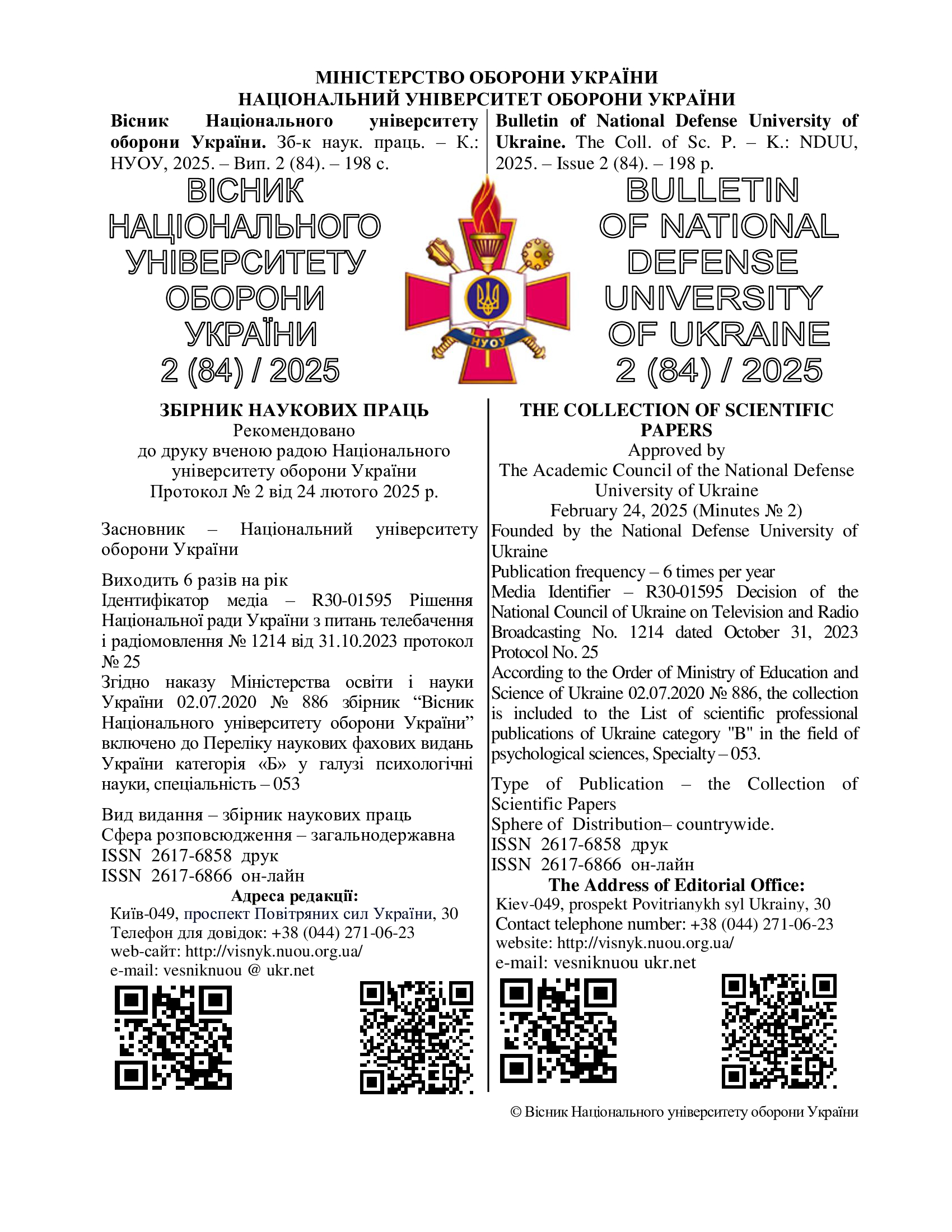ВІЙСЬКОВА СЛУЖБА: ПСИХОЛОГІЧНИЙ КОНТРАКТ
DOI:
https://doi.org/10.33099/2617-6858-2025-84-2-187-193Ключові слова:
психологічний контракт, присяга, військове лідерство, організаційна прихильність.Анотація
Мета цієї статті – виявити і осмислити всі потенційно значущі концептуальні засади формування психологічних контрактів у військовому контексті. У статті доведено, що небажання вступати до лав збройних сил або рішення звільнитися може бути пов’язане з формулюванням «нечітких» психологічних контрактів, пережитим досвідом і враженнями від вербування до збройних сил, значними відмінностями між ідеалізованим та реально досяжними «я»/«робота».
Завантаження
Посилання
Akar, N., & Yörük, T. (2024). A topic modeling-based analysis for the outcomes of psychological contract breaches and violations in organizations: Current research trends and future agenda. Heliyon, 10(14), e34908. https://doi.org/10.1016/j.heliyon.2024.e34908
Altunoğlu, A. E., Kocakula, Özge, & Özer, A. (2022). Demographic differences matter on job outcomes: psychological contract’s mediating role. Business, Management and Economics Engineering, 20(1), 1-22. https://doi.org/10.3846/bmee.2022.14895
Griep, Y., Bankins, S., Vander Elst, T., De Witte, H. (2021). How psychological contract breach affects long-term mental and physical health: the longitudinal role of effort–reward imbalance. Applied Psychology: Health and Well-Being, 13, 263-281. https://doi.org/10.1111/aphw.12246
Khraban, T., Khraban, M. (2023). Uniform as a symbolic stage for organizational and gender identity formation of women serving in the Armed forces of Ukraine. Ukrainian Society, 4(87), 21-36. https://doi.org/10.15407/socium2023.04.021
Khraban, T. (2022). Organizational commitment of military and civilian personnel of the armed forces of Ukraine (psycholinguistic aspect). Scientific Journal of Polonia University, 54(5), 34-42. https://doi.org/10.23856/5404
Khraban, T. (2024). Developing a Well-balanced Military Identity among Female Military Personnel. Polish Sociological Review, 225(1), 69-82. https://doi.org/10.26412/psr225.04
Kiili, S. (2016). Psychological contracts in military voluntary organisation: the essence of psychological contracts. Sõjateadlane (Estonian Journal of Military Studies), 41-70. http://www.ksk.edu.ee/wp-content/uploads/2016/02/S%C3%B5jateadlane_1_03_Kiili.pdf
Kraak, J. M., Griep, Y., Barbaroux, P., & Lakshman, C. (2022). Turnover intentions and safety compliance in the military: A psychological contract perspective. Business Research Quarterly, 0(0). https://doi.org/10.1177/23409444221138582
Lu, F. Psychological Contract in the Australian Defense Force. (2020). The Frontiers of Society, Science and Technology, 2(2), 32-35. https://doi.org/10.25236/FSST.2020.020208
Naweed, A., Hodgkinson, L., & Matthews, R. W. (2021). From dreams to reality: a phenomenological study of the psychological contracts of ex-military personnel in the Australian Defence Force. Journal of Management & Organization, 27(5), 886-910. https://doi.org/10.1017/jmo.2021.39
Ngobeni, D. A., Saurombe, M. D., & Joseph, R. M. (2022). The influence of the psychological contract on employee engagement in a South African bank. Frontiers in psychology, 13, 958127. https://doi.org/10.3389/fpsyg.2022.958127
Pohl, S., Bertrand, F., & Ergen, C.C. (2016). Psychological Contracts and Their Implications for Job Outcomes: A Social Exchange View. Military Psychology, 28, 406-417. https://doi.org/10.1037/mil0000127
Pohl, S., Bertrand, F., & Pepermans, R. (2020). Relationship between psychological contract breach and organizational affective and normative commitment: The role of perceived organizational and supervisory support. Le Travail Humain: A Bilingual and Multi-Disciplinary Journal in Human Factors, 83(3), 269-284. https://doi.org/10.3917/th.833.0269
Potgieter, I., Coetzee, M., & Ferreira, N. (2021). Psychological attachment in the new normal working context: Influence of career navigation and career well-being attributes. African Journal of Career Development, 3(1), a48. https://doi.org/10.4102/ajcd.v3i1.48
Rousseau, D. M. (2001). Schema, promise and mutuality: The building blocks of thepsychological contract. Journal of occupational and organizational psychology, 74(4), 511-541. https://doi.org/10.1348/096317901167505
Seung Y. P. (2021). Correlates of private security officers’ job satisfaction in South Korea. International Journal of Comparative and Applied Criminal Justice, 46, 313-322. https://doi.org/10.1080/01924036.2021.1899001
Topa, G., Aranda-Carmena, M., & De-Maria, B. (2022). Psychological Contract Breach and Outcomes: A Systematic Review of Reviews. International journal of environmental research and public health, 19(23), 15527. https://doi.org/10.3390/ijerph192315527
Zacher, H., Cort, W. R. (2021). Relationships between psychological contract breach and employee well-being and career-related behavior: The role of occupational future time perspective. Journal of Organizational Behavior, 42, 84-99. https://doi.org/10.1002/job.2495
##submission.downloads##
Опубліковано
Як цитувати
Номер
Розділ
Ліцензія
Авторське право (c) 2025 Вісник Національного університету оборони України

Ця робота ліцензується відповідно до Creative Commons Attribution-NonCommercial-ShareAlike 4.0 International License.





